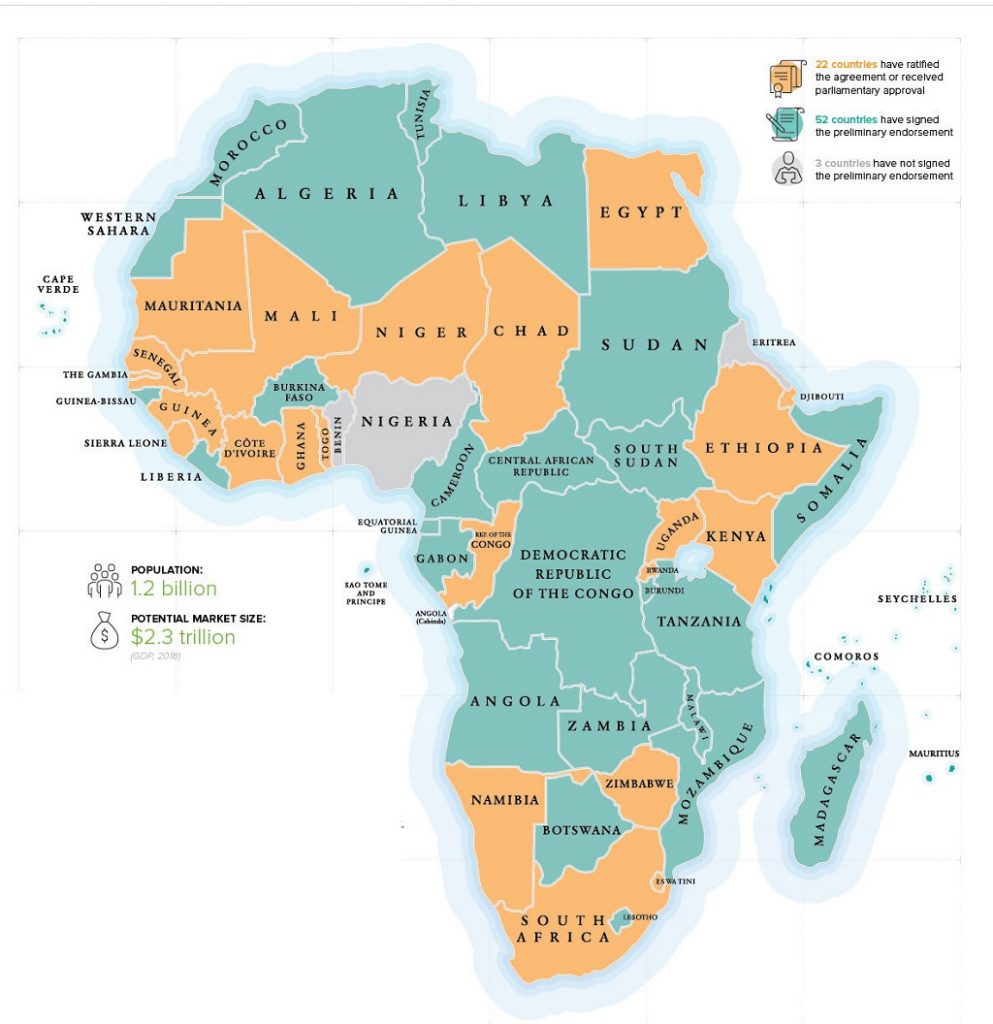Gambia has become the 22nd nation to approve the Africa Continental Free Trade Agreement (AfCFTA) giving the African Union (AU) the minimum threshold for the agreement to come into force.
On Tuesday, April 9th, Gambia’s parliament approved the AfCFTA which was enacted last year to create the largest trade zone in the world.
AfCFTA is expected to increase intra-African trade by 52 per cent by the year 2022 and remove tariffs on 90 per cent of goods.
AU’s Commissioner for Trade and Industry, Albert Muchanga led celebrations of the historic achievement saying that ‘the AfCFTA market is ready for the launch of its operational phase in July this year’.
Ethiopia deposits free trade pact ratification to AU
And as if on cue, Ethiopia on Thursday deposited the instrument of the AfCFTA ratification to the AU Commission.
Ratified by 22 African countries, the AfCFTA has so far seen 19 AU member countries depositing the instruments of ratification to the 55-member pan African bloc.
Sierra Leone and Zimbabwe are expected to make their ratification, according to an AU statement on Thursday.
After the receipt of the 22nd instrument of ratification, the AfCFTA will enter into effect in a month.
Following Ethiopia’s move to deposit its ratification, the Senior Advisor and Chief Trade Negotiator in the Prime Minister’s Office, Mamo Mihretu, said Ethiopia’s ratification was “a historic occasion, marking the first ever free trade agreement Ethiopia has ever signed.”
Mahamat added that Ethiopia, which is the host country of the AU “has taken concrete steps such as the issuance of visas on arrival for citizens from AU member states, as a demonstration of the country’s commitment towards the Free Movement of People Protocol as an integral component of the AfCFTA.”
AU Commission Chairperson Moussa Faki Mahamat said in a statement that this “was indicative of the commitment of the Ethiopian government and the leadership of Prime Minister Abiy Ahmed in advancing the African integration agenda.”
What is AfCFTA?
The UN Economic Commission for Africa (ECA) says the AfCFTA will be the world’s largest free trade zone by the number of countries if ratified by all the 55 African countries.
Launched in Rwanda’s capital Kigali, in March 2018, this continental free trade pact was signed by 44 African countries then. It aspires to create a tariff-free continent to grow local businesses, boost intra-African trade, spur industrialization and create more jobs.
ECA says that once operational, AfCFTA will boost the level of intra-Africa trade in excess of 52 per cent by the year 2020.
The AU says that by the time it convenes its mid-year coordination meeting in July this year in Niamey, Niger, more of its member countries will deposit instruments of ratification.
In a continental meeting held in Addis Ababa in March, African Trade Policy Center Coordinator at the ECA, David Luke, described the AfCFTA as one of the milestone trade policy developments in Africa.
“Africa is set for massive transformation as more countries are expected to sign up and ratify the African Continental Free Trade Agreement (AfCFTA) in 2019. It is expected to change the way Africa does trade and catalyze transformation in a way trade policy has not done before,” he added.
Countries missing from the AfCFTA
Nigeria, Africa’s largest economy is among countries which have abstained from the AfCFTA. The others are Benin and Eritrea whose economies are estimated at less than USD30 billion each.
Interestingly, Nigeria’s economic nominal value is estimated at USD400 billion.
Nigeria’s lack of commitment may be due to the fierce opposition from labour unions and the fact that the country hosts the largest concentration of people living in extreme poverty in the world.
The World Economic Forum acknowledges that “a united African continent working towards common goals would be a major force on the global economic stage.”
WEF adds that there are challenges to effecting the AfCFTA since currently, Africa is a patchwork of regulations and tariffs.
Due to this, trade between countries has suffered as a result.
“For example, only 10 per cent of Nigeria’s annual trade activity is with other African countries. This is a surprise given the country’s dominant economic standing and location firmly in the centre of the continent.”
WEF says that as a whole, Africa’s intra-continental trade level hovers at just around 20 per cent, while nations in Europe and Asia are at 69 per cent and 59 per cent, respectively.
While there is a lot of room for growth, UNCTAD has acknowledged that opening borders between countries could help spur growth on the continent.
“Contrary to media projections, the largest movement of African migrants is within Africa. Migrants also make a very clear contribution to the economy of the country they move into,” Dr Kituyi said.
You can also read how safe, controlled migration benefits African countries where the AfDB’s Senior Vice-President Charles Boamah says migration challenges require bold responses.
He adds, “In this regard, the Bank has developed the CRFA- an excellent tool to build resilience in our regional member countries.”
AfDB says that the AfCFTA is a major force for continental integration.
“It will expand intra-African trade by up to USD35 billion per year and usher in freedom of movement for goods, services and people across the continent’s internal borders, with a regime of reduced tariffs and non-tariff barriers to cut the cost of doing business on the continent. It will also boost agriculture and industrial exports by up to USD66 billion per year.”
This is a guide on how to invest in Ethiopia and questions whether Uganda fair better than Kenya with ALSF’s membership? and reasons why trade in East Africa will be simpler.
